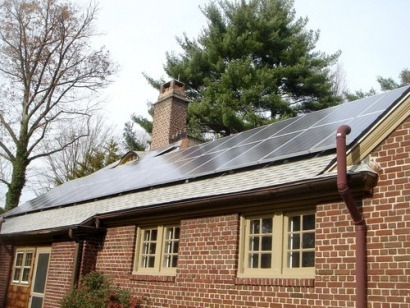
Earlier this year, according to David Roberts writing in Grist, the Edison Electric Institute (EEI), a trade group that represents investor-owned utilities, released a report which admitted that the solar industry could lay waste to American utilities and burn their business model to the ground.
Roberts noted in his article that, as far as he could tell, the report had been largely missed by the mainstream American press. However, this doesn’t stop the growth in solar PV installation being potentially the most revolutionary development ever to have affected the American power industry, and what is happening in America is almost certainly also going to happen in other power sectors around the world.
Cheap, distributed solar PV generates power that is not controlled by the utilities and therefore every kilowatt hour of power generated by solar panels on rooftops is another kilowatt hour lost to the utilities, thereby creating a reduced demand. Roberts points out that, very often, utilities are opposed to energy efficiency for the same reason. Given that solar energy peaks at mid-day, it is therefore strongest a point in the day close to the point where energy is most in demand, “peak load”, which is also the time of day when utilities make most of their money. On that basis, Roberts points out, solar isn’t just reducing demand for utilities product, it is also reducing demand for their most valuable product.
The EEI report dismisses the notion that because “the sun doesn’t always shine” customers will therefore have to remain, at least in part, on the grid. The main reason why this is unlikely is because of continuing developments in energy storage.
“Due to the variable nature of renewable DER, there is a perception that customers will always need to remain on the grid” the report states. “While we would expect customers to remain on the grid until a fully viable and economic distributed non-variable resource is available, one can imagine a day when battery storage technology or micro turbines could allow customers to be electric grid independent. To put this into perspective, who would have believed 10 years ago that traditional wire line telephone customers could economically cut the cord?”
Jim Rogers, the CEO of Duke Energy, has also said: “If the cost of solar panels keeps coming down, installation costs come down and if they combine solar with battery technology and a power management system, then we have someone just using [the grid] for backup.” So, in essence, if enough customers start generating their own energy and merely rely on the grid for backup, it could mean higher bills for those who haven’t switched to solar, as the utilities attempt to maintain their profits. That in turn will generate more demand for solar and energy efficiency, thus driving demand for the grid downwards even further. In short, there will come a point in time where traditional utilities become obsolete. This is why solar PV is regarded as a ‘disruptive technology’ – it will literally erode, even destroy, the utility model of power generation.
The situation is exacerbated by net metering, the system in which payments are made to homes and businesses for the energy they export to the grid from their solar panels. According to California’s top three utilities, this could result in a net loss of revenue in the region of $1.4 billion per year as more and more householders install solar PV systems on their rooftops. The main battleground between solar and the utilities in the US at present is California, but it sets a precedent for what will happen elsewhere and this is why utilities all across the US are now starting to launch efforts to reduce or even eliminate net metering. In Europe meanwhile, the same debate is taking place, it was discussed at the ‘Solar & Utility 2.0: Solar serving the grid’ conference in April this year for instance, and this is in turn forcing European utilities to look at how they can modify and adapt their business models. The Italian firm Enel is one such company to have done so, having recently signed a deal with Japanese company NEC to develop a new generation of smart grids.
So, the EEI report is merely confirming what utilities all across the world already know – the writing is on the wall for the conventional utilities business model, which means if they want to survive they will have to reform.
Further information:

